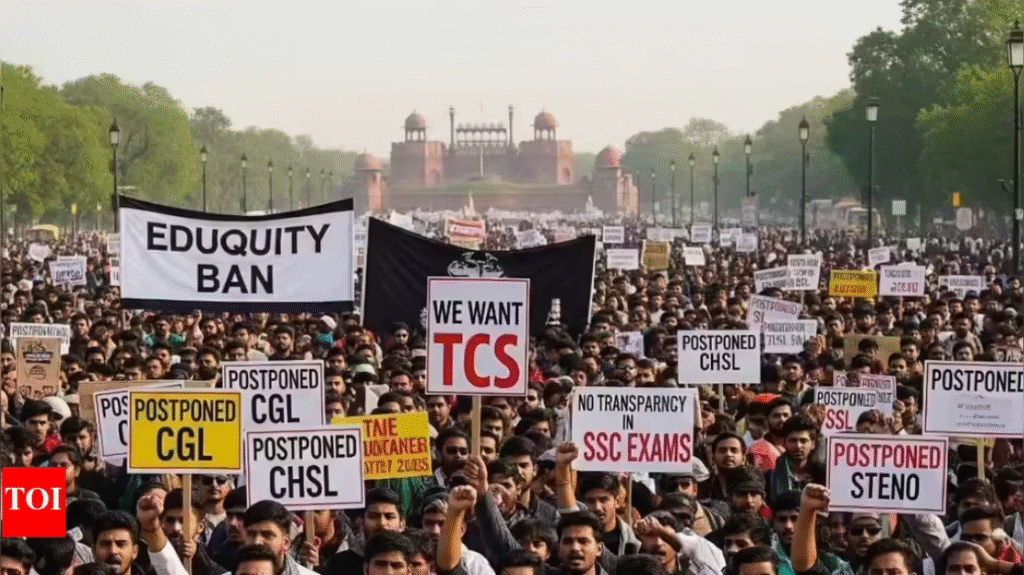The Delhi High Court finds itself entangled in mounting protests and legal turmoil, following a controversial order by the Lieutenant Governor (LG) permitting police witnesses to testify virtually from their police stations. With lawyers striking, a PIL filed, and court proceedings stalled, the issue now tests the balance between justice and executive overreach.
Lawyers Lockdown Courts in Protest
Since August 22, lawyers across Delhi’s district courts have been on an indefinite strike, demanding the withdrawal of the LG’s August 13 notification that allows police and investigating agency witnesses to provide testimony via video conferencing from their stations. Lawyers argue that this violates the principle of fair trials by denying the defense the opportunity to observe a witness’s demeanor and conduct cross-examination effectively.
Tarun Rana, Secretary-General of the Coordination Committee of All District Courts Bar Associations, stated, “Our protest isn’t about us—it’s about protecting the rights of the public to a fair trial.” Courts across Delhi remain virtually functional, handling only urgent matters while most hearings are adjourned.
The Bar Council of India, Delhi High Court Bar Association, and Supreme Court Bar Association have condemned the notification, highlighting that it could “jeopardize trial fairness” and erode public trust in judicial proceedings.
PIL in Delhi High Court: Legal Challenge Launched
Amid the protests, a Public Interest Litigation (PIL) has been filed in the Delhi High Court by Advocate Kapil Madan and his team, challenging the notification’s constitutionality. The petition asserts that allowing police officers to depose from their own stations:
- Violates Article 21 (right to fair trial) by undermining courtroom transparency and cross-examination.
- Breaches Article 14 (right to equality) by advantaging police witnesses over others.
- Flouts Article 50, compromising the separation of executive and judicial functions.
- Contradicts Section 308 of the Bharatiya Nagarik Suraksha Sanhita (BNSS), 2023, which mandates evidence be recorded in court or in the presence of the accused or their representative.
The PIL urges that the LG’s notification be quashed and affirms that deposition should proceed only under judicial supervision.
Legal Stakes: Fair Trial at Crossroads
| Aspect | Legal Implication |
|---|---|
| Transparency | Observing witness demeanor is key to assessing credibility. Virtual testimony could obstruct this. |
| Judicial Integrity | The move encroaches upon judicial authority, diluting the court’s procedural control over evidence. |
| Equality Before Law | Permitting police to testify remotely creates unequal treatment of prosecution vs. defense witnesses. |
While supporters of virtual procedures cite logistical efficiency, defenders argue that justice demands full transparency and rigor—especially in criminal trials.
What Happens Next?
- PIL Hearing: The Delhi High Court is expected to docket the PIL imminently and determine interim reliefs or stay on the notification.
- Strike Continuation: Lawyers have resolved to continue the strike and escalate public outreach via demonstrations if the order remains enforced.
- Possible Government Response: There’s rising pressure to revisit the LG order, with political voices and bar bodies calling for consultation and revision.
Conclusion
The faceoff between Delhi’s lawyers and the LG’s office has evolved into a legal showdown over rights, procedures, and institutional boundaries. At the heart of it lies a crucial question: Will justice be served with full transparency, or compromised for administrative expedience? As the High Court considers legal remedies, the outcome could redefine courtroom dynamics in India.
To read more Indian Laws and news, visit Legal Guide India



